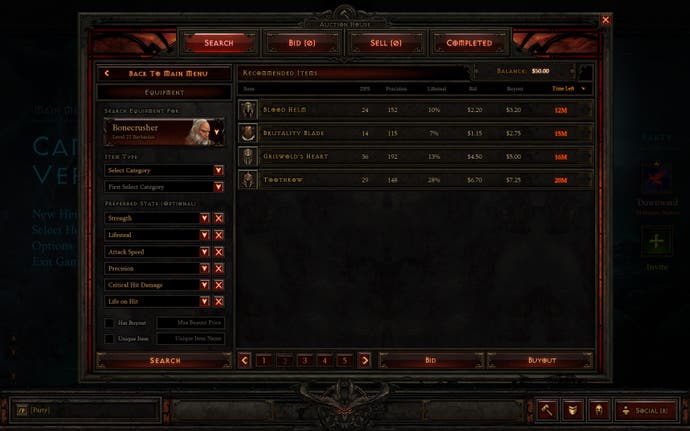The How and Why of the Diablo 3 Auction House
An in-depth look at the first official real money market.
Ahead of my visit to Blizzard's Californian base for a preview of the Diablo III beta, I was told that there was going to be a major announcement. The developer's press office seemed unusually anxious about how it would be received.
Only one thing makes games companies this nervous about messaging: asking players for more money. But when Rob Pardo, Blizzard's vice president of game design, announced Diablo III's real money auction house, all I could do was laugh to myself at the sheer audacity of the move.
Although trading game items for real-world cash is almost as old as online gaming itself, the practice carries a stigma - of cheating, scamming, spam, and the dodgy ethics and inhumane working practices of black-market 'gold farmers'. Diablo III's auction house will be the first major authorised real money trading market in games. As such, it's both historic and controversial.
The reaction has been pretty negative. Gamers feel that Blizzard is squeezing them for extra cash, introducing a 'pay to win' culture to Diablo and legitimising the gold farmers. There's merit to all these arguments, and indeed, Blizzard doesn't really refute any of them. It simply argues that the auction house is consistent with Diablo's game design, and consistent with the way people already play the previous games.
How did this come about? How will it work? And can it - just maybe - be a good thing?
The background
The Diablo role-playing game system has always focused heavily on loot. The items that drop from monsters are extremely plentiful, randomly generated, highly specialised, and rarely if ever awarded for specific quests or achievements. They also do not 'bind' to your character once picked up or equipped; unlike loot in World of Warcraft, say, almost all items in Diablo can be swapped between characters and players at will.

What this means is that, in the rarefied air of high-level Diablo play, advancement and customisation are almost limitless. The time you can pour into searching for the perfect equipment for your character is equally limitless - and there's no guarantee you'll ever get it. This naturally created a market for trading between players as they pooled resources to equip each other.
But there was no trading function to speak of - players actually had to meet up in-game and drop items on the ground, like backstreet dealers - and cheating, griefing, item duping and stealing were rife. What's more, the games' economies were unstable, and players eventually turned to exchanging items for cash, sometimes resorting to unsafe transactions through third-party websites. Scams, including account theft, preyed on the unwary. It wasn't fun for players and it created customer service headaches for the developer.
That, Pardo says, is how Blizzard came to decide that Diablo III needed an integrated item-trading system - and why it had to include the option to trade for real money. "Players really want it. This is something that we know players are going to do either way. We can either provide them a really safe, awesome, fun experience - or they'll find ways of doing it elsewhere."




.png?width=291&height=164&fit=crop&quality=80&format=jpg&auto=webp)



